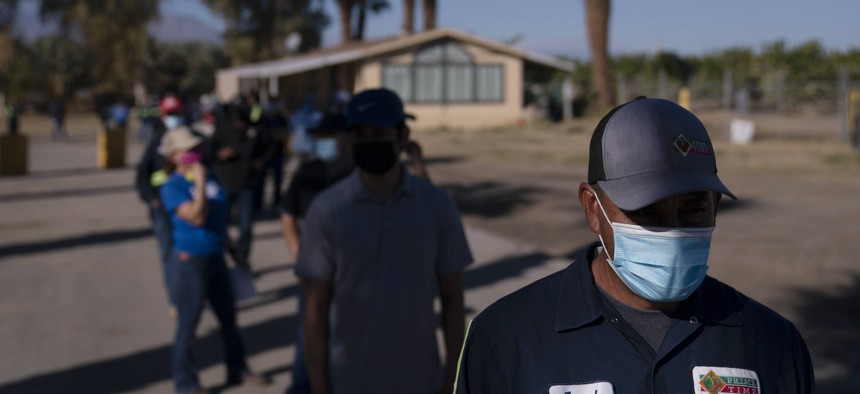California Will Provide $600 Relief Payments to Many Individuals

Farm workers wait in line to receive the Pfizer-BioNTech COVID-19 vaccine at Tudor Ranch in Mecca, Calif., Thursday, Jan. 21, 2021. AP Photo/Jae C. Hong

Connecting state and local government leaders
Gov. Gavin Newsom signed legislation Tuesday that will extend pandemic aid to low-income and immigrant households.
Millions of people living in California, including low-income residents and immigrants, are poised to receive aid payments of $600 or more from the state under coronavirus relief legislation that Gov. Gavin Newsom signed on Tuesday.
The state will make about 5.7 million payments to low-income households as part of the program, according to a state Senate analysis of the bill. The measure is part of a broader package that will also provide about $2 billion for grants to small businesses and nonprofits.
Individuals eligible for the one-time tax refund payments include people who qualify for a tax credit that goes to Californians with incomes up to around $30,000 a year, as well as people using a taxpayer identification number to file their income taxes and who also earn a gross income of $75,000 or less annually.
People using individual taxpayer identification numbers to file their taxes don't have Social Security numbers and many of these taxpayers are immigrants, some in the country unlawfully, who were ineligible for federal aid payments to households earlier in the pandemic.
Those who qualify for the tax credit going to low earners and who also file their taxes using an individual taxpayer identification number are in line to receive $1,200 payments under the legislation.
"Farm workers, food workers, never took a day off," Newsom said during a bill signing event.
He touted that the bill provides aid to mixed immigration status households. "That's something, you know frankly, distinctive," he added. "I don't know many other states, of any other state, that does what this state is doing and for that we are not ashamed."
Assistance to individuals provided under the bill will cost the state about $3.7 billion, according to estimates from the state Senate Budget and Fiscal Review Committee.
Families enrolled in a public assistance program known as CalWorks and those covered by programs that provide support to the blind elderly and disabled would also qualify for grant payments.
The small businesses grants would total up to $25,000 for businesses with as much as $2.5 million annual gross revenue, and to eligible nonprofits. That funding would would augment $500 million in business aid the state is already distributing.
There are a number of other measures included in the relief package as well, including waivers for fees paid by businesses like restaurants, bars, barber shops and cosmetologists—among the corners of the economy hardest hit by the coronavirus outbreak and the public health restrictions to control the spread of Covid-19.
In addition there is aid for agriculture workers forced to quarantine because of the virus, a $400 million slug of federal money to help with childcare costs and $100 million in emergency financial assistance for low-income community college students.
The California relief package comes as President Biden and Democrats in Congress push for a $1.9 trillion coronavirus relief proposal that Republicans are opposed to. That measure includes $1,400 payments to individuals earning less than $75,000.
Earlier federal aid packages included $1,200 and $600 one-time payments to people below that income threshold.
The payments have become controversial in part because people have been eligible for them even if they aren't facing any financial hardship due to the pandemic. Meanwhile, job losses have been heavily concentrated in sectors that are centered around things like dining out, live entertainment, certain in-person retail, travel and tourism.
Bill Lucia is an editor for Route Fifty and is based in Olympia, Washington.

NEXT STORY: Republicans Grill Interior Nominee Over Potential Energy Job Losses





